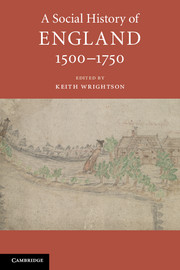Book contents
- Frontmatter
- Contents
- List of Figures
- List of Tables
- List of Contributors
- Acknowledgements
- List of Abbreviations
- Introduction: Framing Early Modern England
- PART I DISCOVERING THE ENGLISH
- 1 Crafting the Nation
- 2 Surveying the People
- 3 Little Commonwealths I: The Household and Family Relationships
- 4 Little Commonwealths II: Communities
- PART II CURRENTS OF CHANGE
- PART III SOCIAL IDENTITIES
- Coda: History, Time and Social Memory
- Further Reading
- Index
2 - Surveying the People
from PART I - DISCOVERING THE ENGLISH
Published online by Cambridge University Press: 28 May 2018
- Frontmatter
- Contents
- List of Figures
- List of Tables
- List of Contributors
- Acknowledgements
- List of Abbreviations
- Introduction: Framing Early Modern England
- PART I DISCOVERING THE ENGLISH
- 1 Crafting the Nation
- 2 Surveying the People
- 3 Little Commonwealths I: The Household and Family Relationships
- 4 Little Commonwealths II: Communities
- PART II CURRENTS OF CHANGE
- PART III SOCIAL IDENTITIES
- Coda: History, Time and Social Memory
- Further Reading
- Index
Summary
To preserve or augment revenues there must bee meanes: the meanes are wrought by knowledge; knowledge had by experience; experience by view and due observacon of the particulars by which revenues doe or maie arise.
To know the present state of my whole diocess before I would enter upon my triennial visitation; I thank God I find no cause to say upon the whole account, he that encreaseth knowledge, encreaseth sorrow.
I have been so ravished with the study of numbers, that if any man will ask me, what is the chiefest Good next to God, that in this life I take delight in? I must answer, Number; if, what is the second? Number; if, what the third? Number.
The making of surveys was always important to those who governed England. Collecting and processing information had long been a tried and trusted governing strategy, and medieval manorial record-keeping, with its lengthy surveys of tenants, holdings and obligations, provided solid grounding for later times. But beyond doubt, the practice of surveying became more vital in all government fields in the course of the sixteenth and seventeenth centuries, and information cultures and systems became more sophisticated and widespread with the emergence of what Peter Burke calls the ‘paper state’.
Deep-seated, long-lasting change made the difference. The English state was transformed by the start of the eighteenth century. The apparatus of governance had to adapt, alter and grow in response to the seismic shifts of the two centuries after 1500: a population boom, religious revolution, economic and commercial transformations in town and country, empire, and root-and-branch reforms of financing and administering the state (to name just five). The precise nature of the ‘Tudor revolution in government’ remains debatable, but this sustained scope and scale of information use by the state had not been seen before. A full list might fill a short book, but we can start with Henrician muster counts; the mountain of paperwork in fiscal returns to the Great Subsidy (1524–5); Wolsey's corn surveys; enclosure commissions; a nationwide system to register births, marriages and deaths (1538); the Valor Ecclesiasticus, which took stock of Church wealth in the wake of Henry VIII's royal supremacy (1535); and a string of state-sponsored surveys in later decades.
- Type
- Chapter
- Information
- A Social History of England, 1500–1750 , pp. 39 - 59Publisher: Cambridge University PressPrint publication year: 2017



